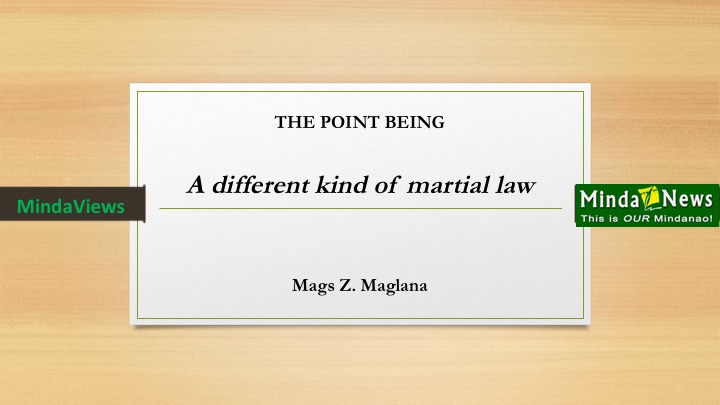WHILE on an official visit to Russia, President Rodrigo Duterte signed Proclamation No. 216 “Declaring a State of Martial Law and Suspending the Writ of Habeas Corpus in the Whole of Mindanao” that cited violent acts of the Maute group in Lanao del Sur, specifically its ongoing rebellious and disastrous conduct in Marawi.
The May 23, 2017 edict also referred to “the capability of the Maute group and other rebel groups to sow terror and cause death and damage to property not only in Lanao del Sur but also in other parts of Mindanao.”
Thus, the rationale was made to cover the entire Mindanao in the third proclamation of martial law in the country after 1946. The first was by Ferdinand Marcos from 1972 to 1981 that had nationwide coverage, and the second by Gloria Arroyo in the province of Maguindanao for seven days in 2009.
 Even before the details of the proclamation were made known to the public because the President had yet to arrive from his shortened trip, social media was abuzz with discussions on how different this iteration of martial law would be, particularly compared to the Marcos version.
Even before the details of the proclamation were made known to the public because the President had yet to arrive from his shortened trip, social media was abuzz with discussions on how different this iteration of martial law would be, particularly compared to the Marcos version.
This was striking because the President had been quoted as saying before he left Russia, “pero ang martial law is martial law ha so kayong mga kababayan ko, you have experienced martial law, itong ngayon, it would not be any different from what President Marcos did. I’ll be harsh.”
The arguments by those who insist that it is a different kind of martial law—even a better one—are highlighted by three types of views: first, citing the 1987 Philippine Constitution; second, that none of the atrocities associated with Marcosian martial law has happened; and third, simply because it is President Duterte who declared it.
Article VII Section 18 is probably the most quoted part of the Constitution these days. According to the National Board of Governors of the Integrated Bar of the Philippines (IBP), the Constitution is “very clear on the authority of the President to declare martial law, the extent of the authority, and the remedies and safeguards against the abuse of that authority.” This is as should be expected from the country’s fundamental law, which was born out of the struggles against dictatorship.
But it is not a self-implementing Constitution. Taking the case of its clearly worded provision against corruption (Article II Section 27 “The State shall maintain honesty and integrity in the public service and take positive and effective measures against graft and corruption“), its potency lies in the actual policies, measures and mechanisms put in place, and the day-to-day efforts of people inside and outside of government to uphold transparency and accountability.
The remedies and safeguards (60 days limit subject to extension; Congressional power to revoke; Supreme Court can review and rule on the “sufficiency of the factual basis of the proclamation of martial law or the suspension of the privilege of the writ;” and non-suspension of the Constitution and the civil courts and legislative assemblies, among others) would only work if they are utilized. The Constitutional provisions do not make Duterte’s martial law automatically different in the implementation; they only partly characterize the conditions under which it has been declared and operationalized. Ultimately, what will set it apart is how it will be carried out.
Martial law will be implemented by a range of actors, some of who will have interests and involvements, which those who support the declaration mainly because of the President may not readily vouch for.
Both legislative chambers seem too eager to accommodate the executive, largely for purposes of quid pro quo and securing largesse.
A general considered an expert in intelligence and counter-insurgency work and suspected of being involved in the 2007 disappearance of farmer-activist Jonas Burgos, son of respected journalist Jose Burgos, has been designated to oversee martial law implementation (Editor’s note: As this piece was written, the martial law administrator as announced by President Duterte was Armed Forces Chief of Staff Gen. Eduardo Ano. Later it was announced that Defense Secretary Delfin Lorenzana would be the martial law administrator)
Despite many attempts to pursue reform, the security sector is still focused on operational effectiveness, and has not overcome and transformed its militarist nature. Thus, martial law under Duterte will largely be carried out by institutions and elements still tainted by the Marcosian bent.
That media has not been muzzled, and people are still able to post on social media were preferred as evidence that this is a different kind of martial law. Granted, it is unlike 1972 when government closed down mass media immediately after the proclamation, and imposed censorship. This time, however, it is not government but purported netizens who are quick to gang up on, invalidate and silence any perceived criticism of Duterte’s martial law.
One might say this is only indicative of robust exercise of the right to free expression. But taken too far, it could mean the silencing of debate and dissent, and ultimately the curtailment of “democracy and our fundamental freedom“ against which the IBP warned.
One more damning because undertaken by forces that have opted to proxy for government.
The third type is argumentum ad hominem in reverse. Simply put: Martial law over the whole of Mindanao has been declared by President Duterte. President Duterte is (and here I will quote a few of those who commented on my social media page) “a different president compared to FEM,“ “abogado si Duterte, alam niya ang ginagawa niya,“ “there will be no other President like we have today,“ and “we don’t know what he is thinking of.“ Therefore, martial law over the whole of Mindanao is different.
Two ways this martial law can be distinguished from previous ones is for continued citizens’ vigilance over the conduct of government as martial law redux plays out, and to commit to free discourse with fellow citizens.
Marcosian martial law is remembered for unleashing brutal state power on those who stood against oligarchic interest. We still have the option of ensuring that the martial law of President Duterte will not go down in history as the time when citizens turned against each other in the mistaken equation of citizenship as defense of government.
(MindaViews is the opinion section of MindaNews. Mags Z. Maglana is a Mindanawon who has worked in various capacities over the past 30 years for peace, good governance, sustainable development, and the promotion of human rights. Maglana is one of the convenors of Konsyensya Dabaw. This piece first came out in two parts on May 26 and 27, 2017 in the author’s column in Sun.Star Davao’s opinion page. This piece is published with permission from the author and Sun.Star Davao.. Please email feedback to magszmaglana@gmail.com)







